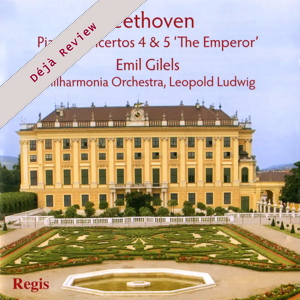
Déjà Review: this review was first published in February 2007 and the recording is still available.
Ludwig van Beethoven (1770-1827)
Piano Concerto No.4 in G, Op. 58 (1805/6)
Piano Concerto No.5 in E flat, Op. 73, “Emperor” (1809)
Emil Gilels (piano)
Philharmonia Orchestra/Leopold Ludwig
rec. April/May 1957, No. 1 Studio, Abbey Road, London, UK
Original review of EMI Classics 4768282
Regis RRC1367 [73]
Classic accounts of Beethoven here, as Bryce Morrison’s overtly laudatory booklet note makes clear. There are many other Gilels versions of both concertos, but none can boast the resplendent orchestral playing that the Philharmonia delivers nor the excellent – if somewhat beefy – sound provided by Walter Legge and Robert Gooch.
Gilels’s discography lists a number of other Fourths: Leningrad with Sanderling (1957); Czech PO also with Sanderling (1958); live from Naples with Pradella (1965); the famous Cleveland cycle of 1968; USSRSO under Masur (1976) and a live Bavarian performance with Sawallisch (1979). Personally I am most familiar with the Szell Cleveland cycle – with which I was brought up. There is significantly more humanity in these readings of over a decade earlier.
The opening of the present Fourth is very serene and unhurried. Originally issued on Columbia 33CX 1055, this is a magnificent performance. The Fourth is in some ways the trickiest, finger-wise, of the Beethovens. Not that anyone would guess it from Gilels’s finger strength at around 9:20 in the first movement. Only some muddying in the orchestral textures detracts – as I say, the orchestral recording can be a bit obscured at times.
Curiously the orchestra sounds rather dry at the opening of the second movement, something one forgets immediately at Gilels’s hyper-placatory entrance. The end of Orpheus and the Beasts is magical; the finale is full of drive; the strings are nicely together at the opening. If the cadenza is perhaps a touch heavy to begin with, it is small cause for complaint. This is memorable music-making.
There are apparently eleven Gilels ‘Emperors’. Of these I would love to hear the live Chicago with Martinon of 1966. With Ludwig, Gilels seems astonishingly at home, able to unleash the largest fortissimi: the chords around 10:30 in the first movement. His sovereign command is never in doubt here, as he shines from first note to last. Fingerwork is crystal throughout.
Ludwig, excellent in No. 4, if anything excels himself in the ‘Emperor’. The very opening E flat chord is absolutely resplendent, while the opening of the Adagio un poco mosso is unutterably tender, the perfect preparation for Gilels’s magic touch. Nice to hear the accompanying woodwind chords around 3:30, just a pity the oboes are not together at 3:34 – a small point perhaps, but once you’ve heard it you start expecting it on rehearings.
The finale is big-boned, a testament, perhaps, to the barn-storming, revolutionary image of Beethoven, with Gilels’s iron fingers again making Beethoven’s demands seem laughably easy. I should report a pressing error on my copy just before the very end (8:26).
These performances demand to be heard.
Colin Clarke
Buying this recording via a link below generates revenue for MWI, which helps the site remain free.



















